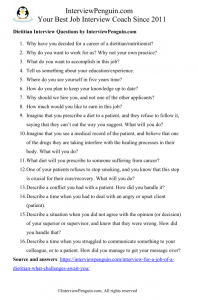We are what we eat, and what we breath. Nutrition plays a pivotal role in both prevention and cure of numerous illnesses and diseases. Yes–your future job is important. Very important. And you should be proud of yourself (or grateful) for the career choice you made. Since it is easy to see a meaningful purpose in your work, you should enjoy doing it for a long time. But what will happen in your interview for this job? What questions will they ask you? And how to succeed? We will try to find the answers in this article.
Table of Contents
Low demand and low supply – strange situation on the job market for dietitians
Many hospitals, nursing homes, and care centers all around the world still do not employ a single dietitian or nutritionist. It isn’t obligatory, and they do not place enough value on the nutrition of their clients or patients. They are making a mistake. Demand for this profession isn’t high, and if you live in a smaller city, you may struggle to find any job openings for dietitians.
On the other hand, the competition is also not extreme. It takes quite a lot of time to become a registered dietitian (3-4 years to earn a degree, 6-12 months internship, 1 month for an exam and getting a license–this varies slightly from one country to another), and the jobs pay less than most other professions in healthcare (average salary is around $50,000 per year).
People with no serous interest in the subject will not pursue this career. This means one thing only: You won’t compete with many other people in the interview. Perhaps just two or three candidates. Summarized and underlined, you are up for an interview with an average difficulty. Let’s have a look at the questions you may face.
Interview questions for dietitians and nutritionists
Typical interview process for this position will start with a few personal questions, and continue with some behavioral (situational, scenario) questions. Interviewers will ask about your education, career choice, goals and plans.
After that they will inquire about your attitude to various situations that happened to you during your internship, or may happen to you in your new job. Let’s have a look at some questions.
Why have you decided for a career of a dietitian/nutritionist?
Everyone loves good stories—they are easy for an ear, and we tend to remember them long after we heard them. So if you have such a good-feel story, for example about someone in your family suffering from certain health problem, and how a dietitian (or just a profound change in nutrition) helped them to improve their condition, or even to get rid of the problem, you should narrate this story. Such an experience can definitely motivate one to choose a career of a dietitian.
Another option is referring to your awareness of the current state in our society, the plethora of health problems people experience, and perhaps even how they are slowly killing their bodies with excessive medication and junk food. You want to help to stop the trend (at least in a local community) and hence your career choice.
The key is to convince them that you see a meaningful purpose in your work, and do not apply for a dietitian/nutritionist job just because you “have to” with your degree…
* May also interest you: Dietary Aide interview questions.
Why do you want to work for us, and not someone else? Why not your own practice, freelancing?
If you happen to be starting your career, the answer is obvious. You firstly want to learn the job and gain experience, before you can start thinking about your own practice. And maybe you can’t even start alone (it isn’t allowed in your country).
But you can also say that you simply prefer employment to freelancing, and do not like to hassle with marketing and client acquisition. You simply want to do a job of a nutritionist/dietitian.
You can also praise their hospital/clinic/health center for something (reputation, facilities, strong focus on nutrition) and say it motivated you to apply for the job with them, and not with one of their competitors. The key is to convince them that they are your first choice, and that you see something positive about their organization. Remember that an honest compliment will never hurt your in an interview. Compliment them for something, make them feel good about themselves. That’s the way how you can win them over.
What do you want to accomplish in this job?
The best answer is probably saying that you want to help each and every patient/client, with right advice and nutritional program. But you can go also for a more holistic approach. You can say that you hope to help to improve the overall health and well-being of the population in your city/country.
The key is to focus on things you want to do for your clients and for your employer, and not for yourself. That’s the selfless attitude employers seek in the very best job candidates.
Imagine that you prescribe a diet to a patient, and they refuse to follow it, saying that they can’t eat the way you suggest. What will you do?
Everyone has their own free will. Your goal is to do the most for the patient, prescribing the best possible diet for their condition, but you can’t force them doing something they do not want to do.
Say that you will explain them, in a calm voice, all the benefits of the suggested nutrition, and also the risks they’d take not following your suggestions. But you won’t shout on them or anything else.
Imagine that you see a medical record of the patient, and believe that one of the drugs they are taking interfere with the healing processes in their body. What will you do?
The right answer depends a lot on your place of work, type of a client, and the medication they are taking. As always, individual approach is the key. But in every setting and situation, you should at least consult your findings with the patient, or with the healthcare professionals responsible for the prescription of the drug in question.
Ensure the interviewers that you won’t take the situation lightly. Surely, you are not a Doctor, but you also play your role in the treatment of a patient, and you should do all you can do for them, within the scope of your responsibility…
What diet will you prescribe to someone suffering from cancer?
Lot of fruits and vegetables (especially raw), nuts, seeds, whole grain, healthy fats and lean protein, and minimizing the consumption of caffeine, alcohol, and processed foods (including refined sugar) make for a good general suggestion.
But we have to consider both financial and family situation of the patient, the options they have when it comes to buying and cooking their own food, as well as their eating and lifestyle habits (often tough to change), religion, stage and type of cancer, and so on, and so forth.
You can either explain general directions, and mention the factors you’d consider when adjusting the diet to each individual patient, or you can explain everything on an example situation (with a model patient).
Other questions you may face in your interview
- Describe a conflict you had with a patient. How did you handle it?
- One of your patients refuses to stop smoking, and you know that this step is crucial for their cure/recovery. What will you do?
- Describe a situation when you did not agree with the opinion (or decision) of your superior and knew that they were wrong. How did you handle that?
- What do you consider your greatest weakness as a dietitian/nutritionist?
- Describe a time when you struggled to communicate something to your boss, colleague, or to a patient. How did you manage to get your message over?
- What courses did you enjoy the most and the least during your undergraduate program?
- What do you do if there are clearly too many people for you to see on a given day?
- What dietary recommendations are important for vegetarians and vegans?
- How important is teamwork for you? Do you consider yourself a team player?
- If you should point out the most important thing you learned during your practice/internship, what will it be?
- ……
Conclusion, great answers to all 30 questions
Interview for a job of a dietitian belongs to interviews with average difficulty. You won’t compete with many other people for the job, but you may face some tough behavioral questions, and your answers to them can make all the difference between getting a job and walking away empty handed.
If you are not sure how to answer the questions, or feel anxious before your interview, have a look at a new eBook I wrote for you, the Dietitian Interview Guide. I cooperated with professionals from hospitals and from a specialized medical recruitment agency, and the content of the book should reflect the reality of the job interviews in the field of dietetics. Check the samples on the eBook page and see for yourself what’s inside…
Thank you for reading, I wish you good luck in your interview!
Matthew Chulaw
* Alternatively you can download the list of questions in a one page long PDF, and practice your interview answers anytime later (even when offline):

May also interest you:
- How to dress for your interview – Four rules to consider when choosing clothes to wear.
- Describe a situation when you found yourself outside of your comfort zone.

